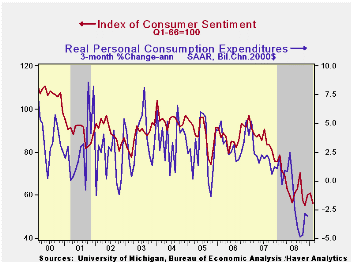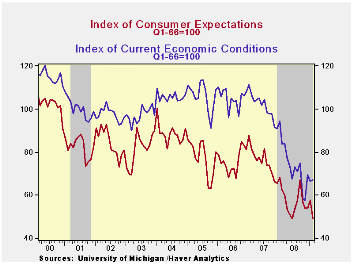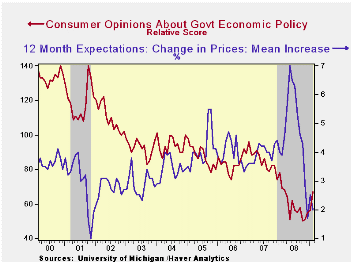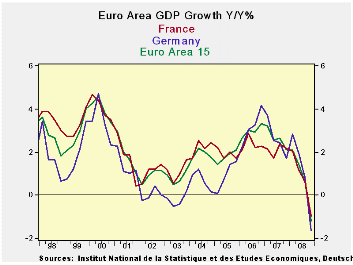 Global| Feb 13 2009
Global| Feb 13 2009Michigan Consumer Sentiment Sinksto Its Lowest Since 1980
by:Tom Moeller
|in:Economy in Brief
Summary
The University of Michigan reported that its mid-February reading of consumer sentiment fell sharply. The 8.2% month-to-month decline to a level of 56.2 nearly reversed all of the gains of the prior two months and returned the index [...]
 The University of Michigan reported that its mid-February
reading of consumer sentiment fell sharply. The 8.2% month-to-month
decline to a level of 56.2 nearly reversed all of the gains of the
prior two months and returned the index to its lowest level since 1980.
The latest figure was down 21% from last February and the reading fell
short of Consensus expectations for an unchanged level of 61.0.
The University of Michigan reported that its mid-February
reading of consumer sentiment fell sharply. The 8.2% month-to-month
decline to a level of 56.2 nearly reversed all of the gains of the
prior two months and returned the index to its lowest level since 1980.
The latest figure was down 21% from last February and the reading fell
short of Consensus expectations for an unchanged level of 61.0.
During the last ten years there has been a 62% correlation between the level of sentiment and the three-month change in real personal consumption expenditures.
The expectations component of consumer sentiment led the decline in the overall February index. The 15.1% month-to-month drop reversed all of the increases during the prior several months and the series landed at its lowest level since 1980.
Expectations for business conditions during the next
year plunged 42.6% m/m to a new low for the series which dates back to
1947.  Expectations for conditions during the next five years
also fell. The expected change in personal finances also fell back to
the lowest level since last June with a sharp 9.6% decline.
Expectations for conditions during the next five years
also fell. The expected change in personal finances also fell back to
the lowest level since last June with a sharp 9.6% decline.
The current economic conditions index ticked up 0.9% after the sharp 4.3% January decline. Buying conditions for large household goods were viewed as having improved very slightly but the index remained down 17.1% from a year earlier. The view of current personal finances also added very slightly to the large January gain but the index remained down by roughly one-quarter from last February.
The opinion of government policy, which apparently influences economic expectations, improved to the highest level since last April . Ten percent of respondents thought that a good job was being done by government while a reduced forty-three percent thought that a poor job was being done.
 Inflation expectations for the the next year fell back to
2.0%. It was as high as 7.0% in May. The range of expectations is from
slight price deflation to a 5.0% increase in prices, though that latter
figure is half the year-ago expectation. The expected inflation rate
during the next five years also fell to 3.0%.
Inflation expectations for the the next year fell back to
2.0%. It was as high as 7.0% in May. The range of expectations is from
slight price deflation to a 5.0% increase in prices, though that latter
figure is half the year-ago expectation. The expected inflation rate
during the next five years also fell to 3.0%.
The University of Michigan survey is not seasonally adjusted.The reading is based on telephone interviews with about 500 households at month-end; the mid-month results are based on about 300 interviews. The summary indexes are in Haver's USECON database with details in the proprietary UMSCA database.
Stabilizing the Housing Market: Next Steps is the recent speech by Federal Reserve Board Governor Elizabeth A. Duke and it can be found here.
Making Sense of the Subprime Crisis from the Federal Reserve Bank of Boston is available here.
| University of Michigan | Mid-February | January | December | February y/y | 2008 | 2007 | 2006 |
|---|---|---|---|---|---|---|---|
| Consumer Sentiment | 56.2 | 61.2 | 60.1 | -20.6% | 63.8 | 85.6 | 87.3 |
| Current Conditions | 67.1 | 66.5 | 69.5 | -19.9 | 73.7 | 101.2 | 105.1 |
| Expectations | 49.1 | 57.8 | 54.0 | -21.3 | 57.3 | 75.6 | 75.9 |
GDP In EMU Falls Hard In 2008-Q4
by Robert Brusca February 13, 2009

GDP is declining in the e-Zone at a very rapid rate. The
fourth quarter GDP declines in the zone have been larger than had been
expected. Declines in Europe are now generally worse than the declines
in the US. Germany has just adopted a second stimulus package worth 50
billion euros over two years to buffer its sagging economy. Budgets in
EMU are beginning to strain or to shatter the EMU guidelines know as
the Maastricht Criteria. Italy and France have been warned by the
Chairman of e-Zone finance ministers, George Junker, about
protectionist policies. "The European Commission needs to examine very
intensively the details of the Italian and French stimulus programs,"
Juncker was quoted as saying in a pre-release of an interview with a
German newspaper. These are the sorts of things that happen in
recession. Survival is the first order of business and sometimes the
rules get trampled or slightly skirted along the road to survival.
As the G-7 finance ministers meet in Italy there is concern
about protectionism. The US too has been warned by Japan. The Japanese
are worried about the ‘buy American’ provisions in the US stimulus
package. No one wants a trade war. But everyone seems to being skating
close to the edge.
Economies are weak and the manufacturing and export-based
economies have been hit the hardest. Note that among this growth of
counties the US Q4 result is second best; Germany and Italy have been
hit hardest. . The US, of course, has a large service sector and it is
a net importing nation. The short fall in US demand has activated one
of the automatic stabilizers in GDP, imports. Imports are weakened so
US GDP has been buffered in its decline, since imports subtract from
GDP growth. Weaker imports mean stronger GDP. But that has transmitted
more weakness overseas to the countries that export to the US. Still
the domestic weakness in the US is severe and it is so severe that
Japan’s Toyota is planning layoffs in its US operations.
This decline in GDP puts everyone on notice for how bad things
are. GDP is one measure all can see and relate to, at least to some
extent. In the US, the labor market has been hit harder than in Europe
with the its broader social safety net and business practices that are
different and a little less quick on the lay-off trigger. There is
concern about how bad the second round effects will be in the US with
such severe labor market displacement. Mitigating that is the task of
the stimulus package. So far US GDP has not been hammered to the extent
expected. But if the US has a more severe second round you can expect
that it will get Europe’s attention too.
| E-Zone and main G-10 country GDP Results | |||||||
|---|---|---|---|---|---|---|---|
| Quarter over quarter-Saar | Year/Year | ||||||
| GDP | Q4-08 | Q3-08 | Q2-08 | Q4-08 | Q3-08 | Q2-08 | Q1-08 |
| EMU-15 | -6.1% | -0.7% | -0.7% | -1.2% | 0.6% | 1.4% | 2.1% |
| France | -4.6% | 0.4% | -1.2% | -1.0% | 0.6% | 1.2% | 2.1% |
| Germany | -8.2% | -2.1% | -2.0% | -1.7% | 0.8% | 2.0% | 2.8% |
| Italy | -7.1% | -2.2% | -2.5% | -2.6% | -1.1% | -0.4% | 0.3% |
| The Netherlands | -3.4% | -1.2% | -0.3% | -0.7% | 1.7% | 3.3% | 4.0% |
| UK | -5.9% | -2.5% | 0.0% | -1.8% | 0.3% | 1.7% | 2.6% |
| US | -3.8% | -0.5% | 2.8% | -0.2% | 0.7% | 2.1% | 2.5% |
Tom Moeller
AuthorMore in Author Profile »Prior to joining Haver Analytics in 2000, Mr. Moeller worked as the Economist at Chancellor Capital Management from 1985 to 1999. There, he developed comprehensive economic forecasts and interpreted economic data for equity and fixed income portfolio managers. Also at Chancellor, Mr. Moeller worked as an equity analyst and was responsible for researching and rating companies in the economically sensitive automobile and housing industries for investment in Chancellor’s equity portfolio. Prior to joining Chancellor, Mr. Moeller was an Economist at Citibank from 1979 to 1984. He also analyzed pricing behavior in the metals industry for the Council on Wage and Price Stability in Washington, D.C. In 1999, Mr. Moeller received the award for most accurate forecast from the Forecasters' Club of New York. From 1990 to 1992 he was President of the New York Association for Business Economists. Mr. Moeller earned an M.B.A. in Finance from Fordham University, where he graduated in 1987. He holds a Bachelor of Arts in Economics from George Washington University.
More Economy in Brief
 Global| Feb 05 2026
Global| Feb 05 2026Charts of the Week: Balanced Policy, Resilient Data and AI Narratives
by:Andrew Cates






